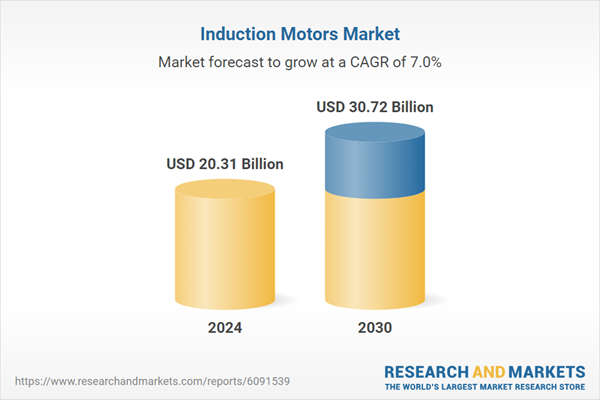Speak directly to the analyst to clarify any post sales queries you may have.
10% Free customizationThis report comes with 10% free customization, enabling you to add data that meets your specific business needs.
Key Market Drivers
Increasing Demand for Energy Efficiency and Sustainability
A major growth driver for the induction motors market is the global push for energy-efficient and environmentally sustainable technologies. As industries face rising energy costs and stricter environmental mandates, there is increasing pressure to adopt systems that minimize power consumption and reduce carbon emissions. Induction motors, especially those adhering to high-efficiency classifications like IE3 and IE4, are seeing widespread adoption due to their cost-efficiency, low maintenance needs, and proven reliability. In many manufacturing operations, electric motors account for a substantial portion of energy use, sometimes up to 70%, making energy-efficient models an essential component in reducing operational costs. Governmental policies and financial incentives such as rebates and subsidies are encouraging industries to upgrade outdated motor systems. As a result, sectors such as HVAC, water management, and logistics are increasingly investing in high-efficiency induction motors to align with sustainability goals and achieve long-term cost savings.Key Market Challenges
Growth of Induction Motors
A key challenge impacting the growth of the induction motors market is the heightened requirement for compliance with energy efficiency regulations, which often demands significant upgrades and retrofits of legacy systems. While induction motors are valued for their durability and operational simplicity, they may fall short in energy performance when compared to alternatives like permanent magnet synchronous motors (PMSMs), especially in variable-speed applications. Regulatory bodies such as the U.S.Department of Energy and the European Union have imposed rigorous standards like IE3 and IE4, compelling manufacturers to make costly design enhancements. This elevates production costs and tightens profit margins. For end-users, particularly small to mid-sized enterprises, the expense of replacing or retrofitting existing motors is a significant financial burden. Additionally, compatibility challenges between newer high-efficiency motors and existing infrastructure create integration hurdles. Without widespread support for modernization and technical upgrades, the transition to next-generation induction motor systems may be slowed.
Key Market Trends
Integration of Smart Motor Technologies
An emerging trend in the induction motors market is the increasing adoption of smart motor technologies and digital connectivity. With the rise of Industry 4.0, manufacturers are embedding sensors and communication modules into induction motors to enable real-time monitoring, predictive maintenance, and remote diagnostics. These smart systems enhance operational efficiency by minimizing downtime and optimizing performance. The convergence of induction motors with IoT platforms allows users to gather actionable insights from equipment data, improving decision-making and asset management.For example, motors equipped with sensors to detect temperature, current, and vibration can alert users to potential faults, reducing the risk of system failures. The trend is gaining traction in critical sectors such as oil and gas, water treatment, and manufacturing, where operational reliability is essential. Technologies like cloud analytics, AI, digital twins, and edge computing are further reinforcing this shift, allowing predictive insights and simulations to refine system performance. Retrofitting solutions and service-based business models, such as motor-as-a-service (MaaS), are also making smart motor integration accessible to legacy systems, driving modernization across the market.
Key Market Players
- ABB Ltd
- Emerson Electric Co.
- AMETEK Inc.
- Siemens AG
- NIDEC Corporation
- Toshiba Corporation
- Danaher Corporation
- Johnson Electric Group
- Regal Rexnord Corporation
- WEG SA
Report Scope:
In this report, the Global Induction Motors Market has been segmented into the following categories, in addition to the industry trends which have also been detailed below:Induction Motors Market, By Type:
- Single-Phase Induction Motor
- Three-Phase Induction Motor
Induction Motors Market, By Application:
- Residential
- Commercial
- Industrial
Induction Motors Market, By Region:
- North America
- United States
- Canada
- Mexico
- Europe
- France
- United Kingdom
- Italy
- Germany
- Spain
- Asia-Pacific
- China
- India
- Japan
- Australia
- South Korea
- South America
- Brazil
- Argentina
- Colombia
- Middle East & Africa
- South Africa
- Saudi Arabia
- UAE
- Kuwait
- Turkey
Competitive Landscape
Company Profiles: Detailed analysis of the major companies present in the Global Induction Motors Market.Available Customizations:
With the given market data, the publisher offers customizations according to a company's specific needs. The following customization options are available for the report.Company Information
- Detailed analysis and profiling of additional Market players (up to five).
This product will be delivered within 1-3 business days.
Table of Contents
Companies Mentioned
- ABB Ltd
- Emerson Electric Co.
- AMETEK.Inc.
- Siemens AG
- NIDEC Corporation
- Toshiba Corporation
- Danaher Corporation
- Johnson Electric Group
- Regal Rexnord Corporation
- WEG SA
Table Information
| Report Attribute | Details |
|---|---|
| No. of Pages | 180 |
| Published | May 2025 |
| Forecast Period | 2024 - 2030 |
| Estimated Market Value ( USD | $ 20.31 Billion |
| Forecasted Market Value ( USD | $ 30.72 Billion |
| Compound Annual Growth Rate | 6.9% |
| Regions Covered | Global |
| No. of Companies Mentioned | 10 |









